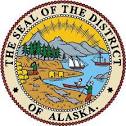JUNEAU, Alaska (AP) — Bills calling for increased local contributions to two state pension programs and an overhaul of a community assistance program have been proposed in the Alaska Senate as lawmakers look to further cut costs amid a bulging budget deficit.
Measures introduced Monday would increase local contributions to the public employees’ and teachers’ retirement systems. They also would phase-out a state-sponsored scholarship program and scale back the community revenue sharing program.
The bills, from the Senate Finance Committee, are interlinked: the teachers’ retirement system and scholarship bills play off each other, as do the public employees’ retirement and community revenue sharing bills.
A major teachers’ union and a municipal group were reviewing the bills and awaiting further details, but expressed concerns with their apparent direction.
Senate Finance Committee co-chair Pete Kelly, R-Fairbanks, said money from the scholarship program would be used to ease the initial impact on districts from the proposed increase in teachers’ retirement system contributions. There is language in the teachers’ retirement bill stating that it’s the Legislature’s intent to provide additional money to districts to mitigate the increased costs for the first five fiscal years under the bill.
Kelly said if lawmakers want to offset the impact on districts, it will have to find the money somewhere, and in this environment, they have to look at things that the state can’t do anymore. The state faces a multibillion-dollar deficit amid low oil prices.
Under the proposals, the scholarship program, which requires recipients fully use their awards within six years of graduating from high school, would end in 2022. SB 208 would allow for scholarships for students who graduate high school on or before July 15, 2016.
The program was created in 2011 as a way to better prepare students for post-secondary success. Scholarship recipients require less remedial coursework and take more credit hours than non-recipients, according to an annual report on the program.
Ron Fuhrer, president of NEA-Alaska, a teachers’ union, said he wants to better understand what the impact on districts will be. He said he has concerns with ending the scholarship program.
Laura Cramer, an aide to Senate Finance co-chair Anna MacKinnon, said provisions in the community assistance bill would make certain property tax exemptions optional, providing a way for communities to offset the proposed increase in their contribution to the public employees’ system.
Kathie Wasserman, executive director of the Alaska Municipal League, worries that making those exemptions optional could impact the calculation for local school contributions, causing them to skyrocket.
She said she doesn’t know where lawmakers expect communities to come up with an increased share for the public employees’ system. Communities had been bracing for changes to the revenue sharing program but they’re also feeling the pinch from a bare-bones state infrastructure budget, cuts to the ferry system and additional pension costs under a previous restructuring of payments, she said.
Then “to hand us another bill on top of things, that’s just, that’s where we have to say, Enough,” she said.
The Senate, in its version of the state operating budget, proposed using $342 million in left-over reserve funds this year toward additional payments to the two retirement systems. The House and Senate have yet to finalize a budget package.


